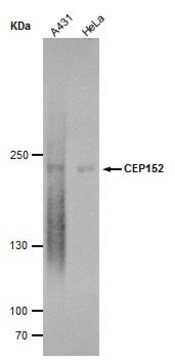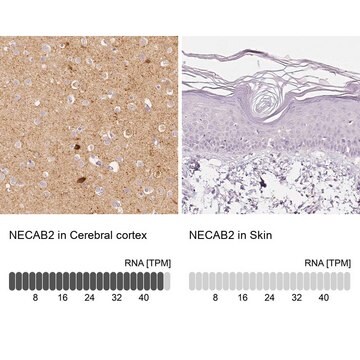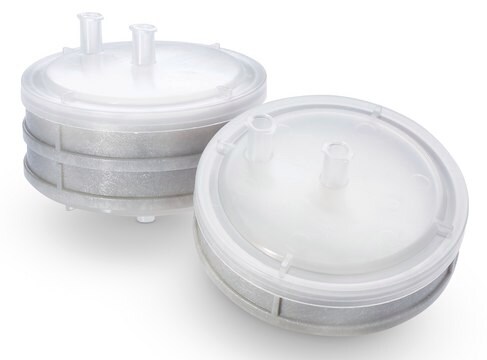Descrição geral
Centrosomal protein of 152 kDa (UniProt O94986; also known as Cep152) is encoded by the CEP152 (also known as KIAA0912) gene (Gene ID 22995) in human. The mammalian Asl (Asterless) ortholog Cep152 is a centrosomal protein (CEP) that plays an important role in centriole duplication and centriole-to-centrosome conversion. The centrosome is the main microtubule-organizing center essential spindle formation and chromosome segregation during mitosis. Centrosomes are composed of two orthogonally arranged centrioles surrounded by pericentriolar material (PCM). Centriole duplication begins by assembling a procentriole in G1/S phase, where centrosomal scaffolds CEP152 and CEP192 (Spd-2 ortholog) mediate the recruitment of polo kinase Plk4 to centrosomes. This is a key event that triggers the entire duplication process. New centrioles assemble perpendicularly to pre-existing ones in G1/S phase and elongate throughout S and G2 phase. The conversion of fully elongated daughter centrioles into centrosomes during mitotic progression requires sequential loading of CEP135, CEP295 (Ana1 analog) and Cep152 onto daughter centrioles.CEP152 is also an important regulator of genomic integrity and cellular response to DNA damage. Overexpression of CEP152 can drive amplification of centrioles. CEP152 gene mutations are identified among individuals with Seckel syndrome, a heterogeneous autosomal recessive disorder characterized by a proportionate short stature, severe microcephaly and mental retardation, and a typical ′bird-head′ facial appearance. CEP152 impairment in Seckel patients-derived cells leads to accumulation of genomic defects as a result of replicative stress through enhanced activation of ATM signaling and increased H2AX phosphorylation.
Especificidade
This polyclonal antibody detects the long isoform of human CEP152. It targets an epitope within 277 amino acids from the C-terminal half.
Imunogênio
Epitope: C-terminus
His-tagged recombinant fragment corresponding to 277 amino acids from the C-terminal half of human CEP152.
Aplicação
Anti-CEP152, C-Terminal, Cat. No. ABE2620, is a highly specific rabbit polyclonal antibody that targets Centrosomal protein of 152 kDa and has been tested in Immunofluorescence and Western Blotting.
Immunofluorescence Analysis: A representative lot detected CEP152 in U2OS cells showing centrosome staining (Sonnen, K.F., et. al. (2013). J Cell Sci. 126(Pt 14):3223-33; Sonnen, K.F., et. al. (2012). Biol Open. 1(10):965-76).
Western Blotting Analysis: A representative lot detected CEP152 in cell lysates from transfected HEK293 cells (Sonnen, K.F., et. al. (2013). J Cell Sci. 126(Pt 14):3223-33).
Research Category
Epigenetics & Nuclear Function
Qualidade
Evaluated by Western Blotting in U2OS cell lysate.
Western Blotting Analysis: 2 µg/mL of this antibody detected CEP152 in 10 µg of U2OS cell lysate.
Descrição-alvo
~ 230 kDa observed; 195.63 kDa calculated. Uncharacterized bands may be observed in some lysate(s).
forma física
Format: Purified
Protein A purified
Purified rabbit polyclonal antibody in buffer containing 0.1M Tris-Glycine, 0.15M NaCl, 0.05% sodium azide, pH7.4 with 0.05% sodium azide.
Armazenamento e estabilidade
Stable for 1 year at 2-8°C from date of receipt.
Outras notas
Concentration: Please refer to lot specific datasheet.
Exoneração de responsabilidade
Unless otherwise stated in our catalog or other company documentation accompanying the product(s), our products are intended for research use only and are not to be used for any other purpose, which includes but is not limited to, unauthorized commercial uses, in vitro diagnostic uses, ex vivo or in vivo therapeutic uses or any type of consumption or application to humans or animals.









